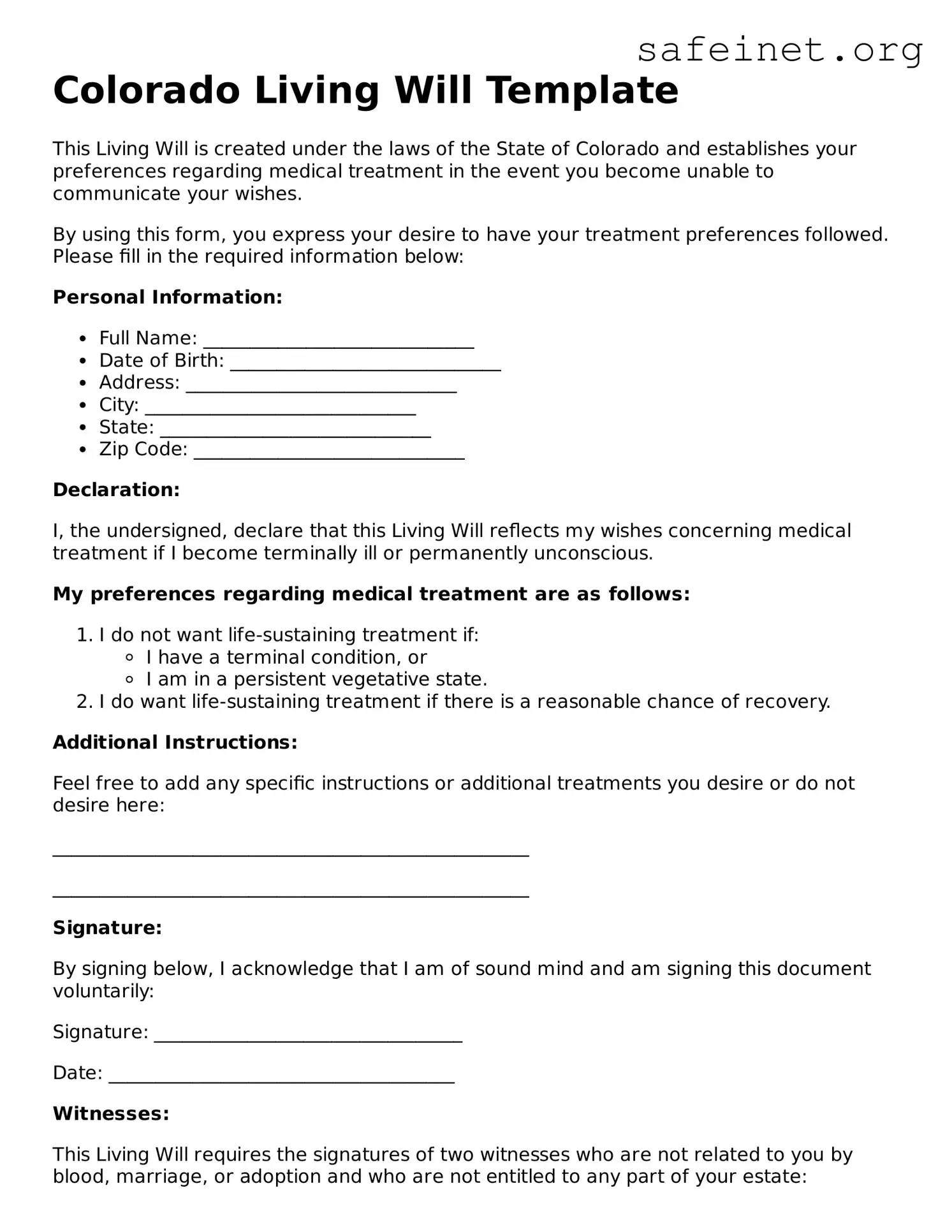What is a Colorado Living Will?
A Colorado Living Will is a legal document that outlines your wishes regarding medical treatment in case you become unable to communicate them. This form addresses what types of life-sustaining treatments you would or would not want, such as resuscitation, mechanical ventilation, and artificial nutrition. It ensures that your healthcare preferences are understood and respected by your medical team and loved ones.
Who can create a Living Will in Colorado?
In Colorado, any adult who is at least 18 years old and has the capacity to make decisions about their healthcare can create a Living Will. This includes individuals who are of sound mind and capable of understanding the implications of their choices concerning medical treatment.
How do I create a Colorado Living Will?
You can create a Colorado Living Will by completing a state-approved form, which can often be found online or at local healthcare facilities. Once completed, it must be signed in the presence of two witnesses or a notary public. This step is crucial, as it ensures that your document is legally binding and recognized by healthcare providers.
Can I change or revoke my Living Will?
Yes, you can change or revoke your Living Will at any time as long as you are mentally competent. Simply create a new document or destroy the existing one. It is advisable to inform your healthcare providers and loved ones of these changes so they are aware of your current wishes.
What happens if I don’t have a Living Will?
If you do not have a Living Will in place, medical decisions will be made based on general state laws and the judgment of your healthcare providers. This can sometimes lead to uncertainty and stress for your loved ones, who may not know your preferences. Having a Living Will provides clarity and alleviates potential conflicts during difficult times.
Are healthcare providers required to follow a Living Will?
Yes, healthcare providers in Colorado are legally required to follow the instructions in a valid Living Will. This means they must respect your wishes regarding medical treatment as long as the document meets the legal requirements. However, it’s essential to communicate your decisions with your healthcare team to ensure they understand your preferences.
Can I include specific instructions in my Living Will?
Absolutely. A Colorado Living Will allows you to detail specific medical treatments you would or would not want. You can express your desires about life-sustaining measures, pain management, and other treatments. Including clear instructions can help avoid confusion later on.
Is a Living Will the same as a Durable Power of Attorney for Health Care?
No, they are not the same. A Living Will specifies your medical treatment preferences, while a Durable Power of Attorney for Health Care allows you to designate an individual to make healthcare decisions on your behalf if you cannot do so. It is often beneficial to have both documents to cover different aspects of your healthcare wishes.
Is there a cost to create a Living Will?
Creating a Living Will is generally free if you use the state-provided forms available online. However, if you seek assistance from an attorney or other professionals to draft the document, there may be associated fees. Keeping your Living Will updated or seeking legal advice can entail costs, so it’s wise to budget accordingly.
Are Living Wills only for the elderly or terminally ill?
No, Living Wills are important for adults of all ages. Unexpected medical emergencies can occur at any time. Having a Living Will ensures that your healthcare preferences are known, regardless of your current health status. It’s a proactive step that can provide peace of mind for both you and your loved ones.
